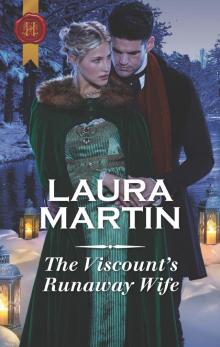- Home
- Laura Martin
Secrets Behind Locked Doors
Secrets Behind Locked Doors Read online
From the darkest of shadows…
After a year wrongfully imprisoned in an asylum, Louisa Turnhill can’t believe it when Robert, Lord Fleetwood, arrives to rescue her. As her new guardian, he’s there to take Louisa to his London town house—and a different life.
…to the dazzling swirl of the ton
Thrust into an unknown world of debutantes and balls, Louisa starts to put her trust in Robert. But his life is tainted with darkness, too. With society’s eyes upon them, will they ever be able to shake off the secrets that once lurked behind locked doors?
“I want to take you away from here, Louisa,” he said eventually. “I want to take you somewhere safe while I figure out exactly what’s happened.”
Her eyes narrowed suspiciously. Robert surmised she hadn’t had much reason to trust people in the past few years. She wrapped her arms around her body protectively and started to hunch into herself.
“I promise I won’t hurt you,” Robert said, kneeling down in front of her and gently taking her hand. “I won’t let anyone hurt you ever again.”
She flinched as his skin touched hers, not pulling her hand away but cowering a little as if she expected him to hit her.
“Trust me,” he said quietly.
Louisa regarded him for almost a minute in silence, staring into his eyes, and Robert felt as though she’d studied his soul. Eventually she gave a small, almost imperceptible nod.
Author Note
Ever since I can remember I have been fascinated by the workings of the mind; what makes one person thrive while another will withdraw into themselves. One thing that has particularly intrigued me is how society’s perception of mental illness has changed over time. This is demonstrated perfectly by our treatment of those suffering from mental illness. Hundreds of years ago such people were shunned by society and cast out of their communities. In the Regency period the common practice was to lock away anyone with unexplainable behavior and pretend they didn’t exist. This led to an increase in the number of unregulated and unlicensed institutions where the unfortunate inmates received no rehabilitation or medical care, worsening their conditions. Stories abound about unfortunate individuals discarded in the asylums by their relatives who, despite having no reason to lock them up, wished to gain from their disappearance.
Another psychological theme runs through the book. For centuries, men have fought in wars which have left mental as well as physical scars. The symptoms of shell-shock, or post-traumatic stress disorder, have only recently been recognized as a consequence of the strains that battle places upon the psyche. However, the soldiers of the Napoleonic wars would have been subject to many of the same stresses as soldiers of today. Secrets Behind Locked Doors explores how such mental scars can be a barrier between the sufferer and the wider world. In writing a character with some features of PTSD I hoped to portray how the disorder can impact on every aspect of life, including love.
Laura Martin
Secrets Behind Locked Doors
Laura Martin writes historical romances with an adventurous undercurrent. When not writing, she spends her time working as a doctor in Cambridgeshire, where she lives with her husband. In her spare moments Laura loves to lose herself in a book and has been known to read cover to cover in a single day when the story is particularly gripping. She also loves to travel, especially visiting historical sites and far-flung shores.
Books by Laura Martin
Harlequin® Historical
The Pirate Hunter
Secrets Behind Locked Doors
For Dad, for all the inspiration and encouragement.
And for Luke. I couldn’t do it without you.
Contents
Chapter One
Chapter Two
Chapter Three
Chapter Four
Chapter Five
Chapter Six
Chapter Seven
Chapter Eight
Chapter Nine
Chapter Ten
Chapter Eleven
Chapter Twelve
Chapter Thirteen
Chapter Fourteen
Chapter Fifteen
Chapter Sixteen
Chapter Seventeen
Chapter Eighteen
Chapter Nineteen
Chapter Twenty
Chapter Twenty-One
Chapter Twenty-Two
Chapter Twenty-Three
Chapter Twenty-Four
Chapter Twenty-Five
Chapter Twenty-Six
Chapter Twenty-Seven
Chapter Twenty-Eight
Chapter Twenty-Nine
Chapter Thirty
Chapter Thirty-One
Chapter Thirty-Two
Epilogue
Excerpt
Chapter One
Robert fought the urge to turn around and flee. He wasn’t a man who had ever run from anything. Six years he’d fought in the army and he’d never backed down from a fight, but right now his courage was deserting him.
‘Ready, sir?’ asked Yates, his agent, apparently oblivious to his discomfort.
Robert nodded, raised his hand and knocked on the imposing front door.
The stench hit him as soon as he walked inside. It was a mixture of sweat and cabbage and something else he didn’t even want to guess at. He wondered how the staff coped with it, the smell permeating their clothes and lingering as they returned home to their families. At least they could return home though, he supposed. Some of the inmates wouldn’t ever leave the confines of the Lewisham Asylum; they’d spend long years cooped up in the dreary rooms with only their screams for company.
‘Lord Fleetwood—’ a grubby little man hurried out to greet them ‘—it is such an honour to meet you. I’m Symes, the humble proprietor of this establishment.’
Robert nodded silently in greeting. He wanted to get his business here sorted as quickly as possible and escape. Already he was feeling despair, the same sensation the patients must have felt as they were dragged out of the sunlight one last time.
‘I said to your man there must be a mistake,’ Symes said as he led Robert into his office. ‘None of our patients are gently born, we haven’t got any ladies here.’
Robert very much hoped so, but in the ten years Yates had worked for him he hadn’t known the man to be wrong.
‘You have a patient listed as Louisa Turnhill?’ Robert asked.
Symes flicked through the ledger in front of him, his short, pudgy fingers crinkling the paper.
‘Louisa Turnhill, aged nineteen. Came to us just over a year ago.’
Over a year in this place. Robert couldn’t even begin to imagine it.
‘What’s wrong with her?’ Robert asked bluntly.
Symes squirmed a little in his seat, but dutifully read out the entry next to her name. ‘Melancholy and mania. Violent outbursts. Hallucinations.’
‘And what is her treatment?’
Symes looked at the two men in front of him blankly.
‘Treatment?’ he asked.
‘Yes, what are you doing to make her better?’ Robert had a sneaking suspicion he knew the answer to this question, but he persisted anyway. ‘How do you propose to cure her?’
‘Oh, there is no cure, Lord Fleetwood,’ he said, baring his yellow teeth in an uncomfortable smile. ‘We don’t deal in cures here, just room and board and a place for the wretched to stay out of the way of the rest of the world.’
>
Robert knew he’d never been in a more depressing place. Nearly one hundred poor souls locked in grim little cells with no hope of a cure and for many of them no hope of release.
‘Tell me,’ he said reluctantly, ‘how is Miss Turnhill presently?’
Symes shrugged. ‘I oversee the asylum, I don’t visit the inmates. You can see for yourself.’
He stood and stuck his head out into the corridor, motioning for a middle-aged woman to come into the room.
‘Show this gentleman to Room Sixty-Eight,’ he ordered.
Robert followed the dowdy woman up three flights of stairs. All around him screams and moans were muffled by thick wooden doors. He wondered how anyone got any rest. He wasn’t surprised they didn’t hope to cure anyone at Lewisham Asylum; he rather suspected it would turn a sane person mad within a month.
‘She’s in here, sir.’
The female warden slotted a key into the lock in front of her and opened the door.
Robert steeled himself, then stepped inside. He turned to see the door closing behind him as the warden locked him in.
He waited a minute for his eyes to adjust to the darkness. There was a tiny window, high up in the wall, covered almost entirely with bars. It let in a sliver of sunlight, but nowhere near enough to illuminate the room. In one corner was a metal bed and in another a small pot. The walls were whitewashed and the floor beneath his feet bare floorboards.
At first glance Robert thought they’d brought him to the wrong room, an empty room. For a few seconds he didn’t see the slender young woman crouching by the side of the bed, her wrist encircled by a manacle and a chain securing her to the wall. She was sitting completely still, regarding him with wide brown eyes.
‘Miss Turnhill?’ he asked.
She shied away from him as he took a step towards her.
‘Louisa?’ he tried again.
In his least threatening manner Robert ambled across the room and took a seat on the bed. It was hard, little more than a metal frame with an inch-thick straw mattress.
‘My name is Robert, I’m here to help you.’
The young woman cocked her head to the side and scrutinised him. For an instant Robert wondered if she was dumb, or if she’d forgotten how to speak in her year of captivity.
‘No one’s here to help me,’ she said eventually, her voice a little croaky as if underused.
‘I would really like to learn a little more about you,’ he said softly.
She chuckled and Robert wondered if she was about to become hysterical.
‘No, you wouldn’t.’
‘How are you feeling today?’ He tried a different tack.
She paused, regarding him seriously. ‘Not too mad today, thank you very much.’
Robert felt as though he’d been transported to another world. He had no idea how to talk to this young woman. She didn’t seem mad, at least not at first glance, but he wasn’t exactly an expert.
‘Are you going to hurt me?’ she asked as if enquiring about the weather.
Robert looked at her carefully. Underneath her uninterested demeanour he realised she was scared. Petrified, even.
‘I promise I’m not going to hurt you,’ he said sincerely.
She relaxed a little. ‘Have you brought any food?’ she asked.
Robert wondered how she’d gone from violence to food so quickly. His confusion must have shown on his face.
‘When people come in it’s either to hurt me or bring me food,’ she said calmly.
Robert Fleetwood, hardened soldier and celebrated war hero, felt his heart go out to this scared young woman. In that instant he vowed silently to help her. Even if she wasn’t the Louisa Turnhill he was looking for, he would make sure she was properly looked after, somewhere a long way from Lewisham Asylum.
‘Will you tell me how you came to be here, Louisa?’ Robert asked.
She stood, the chain attached to her wrist jangling as she moved. He saw she was thin—a year of asylum food didn’t seem to provide much nourishment. Her hair was long and straggly, falling most of the way down her back. There were bruises on the pale skin of her arms and dark circles under her eyes. She was in a poor state, but despite all of this Robert saw the spirit burning in her eyes as she watched him look over her. In her time at the asylum they hadn’t broken her.
She came and sat on the bed next to him, making sure there was as much distance as possible between them.
‘There’s no point,’ she said, turning her face towards him, ‘you wouldn’t believe me anyway.’
It was said with such certainty that Robert knew he had to hear her story. He wondered if she was deluded, whether she would tell him a different tale if he came back tomorrow.
‘I might,’ he said simply.
‘If you stay here overnight, there’s lots of screaming,’ Louisa said. ‘And moaning and shouting. Do you know the most common thing people shout?’
He shook his head.
‘They shout “I’m not mad”—’ she paused ‘—or “I shouldn’t be here”, which is much the same thing.’
Robert couldn’t imagine spending a single night in this hellish place, let alone over four hundred as she must have done.
‘Everyone says it,’ she said with a small smile on her face. ‘But I actually mean it.’
‘You shouldn’t be here?’
‘I’m not mad,’ she said, ‘or at least I wasn’t when they put me in here.’
He didn’t know how to respond. He’d expected howling and writhing, he’d been prepared for that—this cool, detached statement of sanity he didn’t know how to react to.
‘I probably am a little bit mad now. Anyone would be after a few months in this place.’
She looked at him and Robert got the sensation she was assessing him, weighing up whether he was worth revealing more to.
‘I said you wouldn’t believe me.’
‘What happened?’ Robert asked simply, not trusting himself to say more. He got the feeling this strange young woman was very astute—she’d know if he lied to her.
‘You actually want to know?’
‘I want to know.’
‘I had an evil guardian,’ she said, then giggled. ‘Your face is a picture.’
Robert hadn’t realised he’d moved a muscle.
‘My evil guardian locked me up here after I refused to marry him. Lecherous old sod.’
Sometimes she sounded so normal, so sane, but Robert knew there were some lunatics like that. So caught up in their fantasy world they could make others believe it was true.
‘He wanted the money my parents had left to me. When I wouldn’t give it to him through marriage, he bribed a doctor to certify I was insane and dumped me here. I should imagine he’s worked his way through most of the money by now. Not that it’s any use to me in here.’
Robert knew he shouldn’t believe her. He knew he was probably being manipulated, conned into believing her fantasy, but the disbelief in his mind was giving away to horrified realisation.
He’d received a letter eight weeks ago, a confession of sorts. It had been sent the day before his great-uncle had died. In the letter his great-uncle confessed to committing a grave sin and asked Robert to put it right. The only other information the old man had supplied was Louisa’s name.
Surely this wasn’t the sin his great-uncle had talked of. Robbing a young woman of her fortune was one thing, but to rob her of her freedom and label her as insane was worse than murder.
He cursed the man again for not providing more details of his crime.
‘And who was your guardian?’ he asked, trying to make his tone casual even though he was holding his breath in anticipation of her answer.
‘Thomas Craven,’ she said. ‘The name I curse last thing every
night and first thing every morning.’
Robert felt the foundations of his world rock. This young woman must have been the ward of his great-uncle, Thomas Craven, otherwise there was no way she could have given him the right name.
When Yates had tracked Louisa down to the asylum, Robert hadn’t known what to expect. He’d wondered if his great-uncle had somehow played a part in this young woman’s descent into madness, maybe by robbing her of her innocence, an event she hadn’t been able to recover from, and for which his great-uncle had rightly blamed himself. No part of him had been prepared for the possibility she’d been wrongly imprisoned for over a year.
‘It’s all right,’ she said, patting him on the hand in a sisterly gesture, ‘you don’t have to believe me.’
Robert stood and paced to the other side of the tiny room, trying to buy himself time to figure out what he believed.
‘I want to take you away from here, Louisa,’ he said eventually. ‘I want to take you somewhere safe whilst I figure out exactly what’s happened.’
Her eyes narrowed suspiciously. Robert surmised she hadn’t had much reason to trust people in the last few years. She wrapped her arms around her body protectively and started to hunch into herself.
‘I promise I won’t hurt you,’ Robert said, kneeling down in front of her and gently taking her hand. ‘I won’t let anyone hurt you ever again.’
She flinched as his skin touched hers, not pulling her hand away, but cowering a little as if she expected him to hit her.
‘Do they beat you here?’ he asked, suddenly catching sight of the bruises on her arms for a second time.
She laughed in disbelief. ‘Of course.’
Robert felt the rage building inside him, rage he thought he’d managed to control for so long. He didn’t know if this young woman was mad or the victim of a very heinous deception, but either way she didn’t deserve to be beaten. She shouldn’t be chained to the wall, frightened of every person who entered her dismal cell. She deserved more than that, every human did.
‘Trust me,’ he said quietly.

 The Brooding Earl's Proposition
The Brooding Earl's Proposition Reunited with His Long-Lost Cinderella
Reunited with His Long-Lost Cinderella Courting the Forbidden Debutante
Courting the Forbidden Debutante Glitch
Glitch Flirting with His Forbidden Lady--A Regency Family is Reunited
Flirting with His Forbidden Lady--A Regency Family is Reunited The Monster Missions
The Monster Missions Falling for His Practical Wife
Falling for His Practical Wife Her Rags-to-Riches Christmas
Her Rags-to-Riches Christmas Secrets Behind Locked Doors
Secrets Behind Locked Doors Under a Desert Moon
Under a Desert Moon Her Best Friend, the Duke
Her Best Friend, the Duke An Earl to Save Her Reputation
An Earl to Save Her Reputation Heiress on the Run
Heiress on the Run The Ark Plan
The Ark Plan A Ring for the Pregnant Debutante
A Ring for the Pregnant Debutante Code Name Flood
Code Name Flood The Viscount's Runaway Wife
The Viscount's Runaway Wife An Unlikely Debutante
An Unlikely Debutante